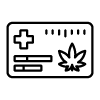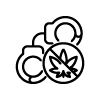Cannabis Laws in Washington D.C.

Fully Legalized for Adult Use?

Fully Legalized for Medical Use?

CBD only?

Decriminalized?
Disclaimer: This information is provided for general informational purposes only and may not reflect the most current legal requirements in Washington D.C.. Cannabislaws.global recommends you consult with a qualified local attorney or legal expert for accurate and up-to-date information. This information is not intended as legal advice and should not be relied upon as such. Use of this information is at your own risk.
Does Washington D.C. have a recreational use program?
Yes, recreational use is legal in Washington D.C. Initiative 71, the Legalization of Possession of Minimal Amounts of Marijuana for Personal Use Act, was passed by voters in D.C. in 2014. With 64.87% of the vote, this bill was approved. As a result, people could legally use marijuana in D.C. starting in 2015.
Does Washington D.C. have a medical program?
Yes, medical cannabis is legal in Washington D.C. Most people in the District (69%) supported Initiative 59 on the 1998 ballot, which made medical marijuana use legal for some serious conditions. In 2013, patients could finally buy medical marijuana from retail establishments.
What are the rules for medical use?
People who live in Washington D.C. legally and have a medical marijuana recommendation from a qualified doctor can use medical marijuana. They must also have one of the qualifying medical conditions or be receiving one of the qualifying medical treatments.
Non-residents of eligible areas can also buy medical marijuana at medical cannabis dispensaries in D.C. by showing their printed or digital medical marijuana cards or registrations.
D.C. gives medical marijuana cards to people who are qualified and are at least 18 years old. Applications from guardians and patients younger than 18 years old cannot be made online. Also, first-time patients in Washington D.C. are not allowed to use telehealth services to get medical cannabis advice from doctors. To get approved for medical cannabis for the first time, they have to see their doctors in person.
People who live in or don’t live in Washington D.C. can also apply for a medical marijuana card. A cannabis user who does not live in D.C. can only get a 30-day temporary medical marijuana registration card while they are visiting, though.
Minors can get medical marijuana with the help of a caretaker. Before a minor can get a medical marijuana card that lets them use medical marijuana, they need to be diagnosed and get medical cannabis approval from a qualified medical professional in D.C. This will allow them to use medical marijuana.
What are the qualifying medical conditions for eligibility?
- HIV
- AIDS
- Glaucoma
- Cancer
- Conditions characterized by persistent and severe muscle spasms, including multiple sclerosis
- Any other condition determined by DC that is chronic, debilitating, and interfering with the basic functions of life for which the use of medical marijuana is beneficial
- Any condition that cannot be effectively treated by any ordinary surgical or medical measure or for which there is scientific proof that the use of medical marijuana is likely to be significantly less addictive
- Any condition requiring medical treatment for which chemotherapy, azidothymidine or protease inhibitors, or radiotherapy use is required
What are the medical program limits?
People with a medical marijuana card in Washington D.C. can buy up to 8 ounces of marijuana every 30 days and have up to 2 ounces on hand at all times.
What methods of use are permitted under the medical program?
In Washington D.C., marijuana dispensaries frequently sell cannabis in a variety of forms, including concentrates, foods, flowers, and applications.
On the other hand, they can’t sell cannabis to people who just want to use it for recreation, in alcohol or tobacco form.
Is there home delivery for medical cannabis?
Medical marijuana delivery is allowed, and some licensed medical cannabis dispensaries offer it to patients 18 years or older and their caregivers.
Only residential locations in D.C. are eligible for delivery from medical marijuana businesses.
Is CBD legal in Washington D.C.?
Yes, CBD is legal in Washington D.C.
In November 2014, marijuana use for recreational purposes became legal in the District of Columbia. This means that CBD oil from any source is allowed there. Still, CBD goods made from hemp and marijuana are governed by different rules.
Adults over 21 can buy marijuana and its derivatives, like CBD oil, from a state-licensed dispensary. Each transaction limits the amount of marijuana an adult can have in their hands to one ounce. It has been raised to 72 ounces for CBD oil because it is considered a marijuana-infused beverage.
People who live in Washington D.C. can use, own, and sell CBD oil made from hemp as long as it doesn’t have more than 0.3% THC.
Is cannabis decriminalized in Washington D.C.?
Yes, cannabis is decriminalized in Washington D.C.
Amounts of Marijuana Decriminalization Amendment Act became law on July 17, 2014. The law was made to stop racial bias in arrests for marijuana possession and to protect civil rights in the District. Before this law was made, people found with less than an ounce of cannabis could go to jail for up to 30 days, with or without a fine. The Act eliminated the fines for having up to an ounce of cannabis or related items.
The current law says that having more than 2 ounces of marijuana on you or giving it to someone else without getting paid is a civil crime. For this crime, the person responsible will get a $25 fine and have any cannabis or drug tools taken away.
People younger than 18 who are caught with up to an ounce of marijuana would also have to pay a $25 fine and give up all the marijuana they had on them.
Disclaimer: This information is provided for general informational purposes only and may not reflect the most current legal requirements in Washington D.C.. Cannabislaws.global recommends you consult with a qualified local attorney or legal expert for accurate and up-to-date information. This information is not intended as legal advice and should not be relied upon as such. Use of this information is at your own risk.

CannabisLaws.global
Your global guide to cannabis laws

Washington D.C. Legal Aid
contact [email protected] to own this page
